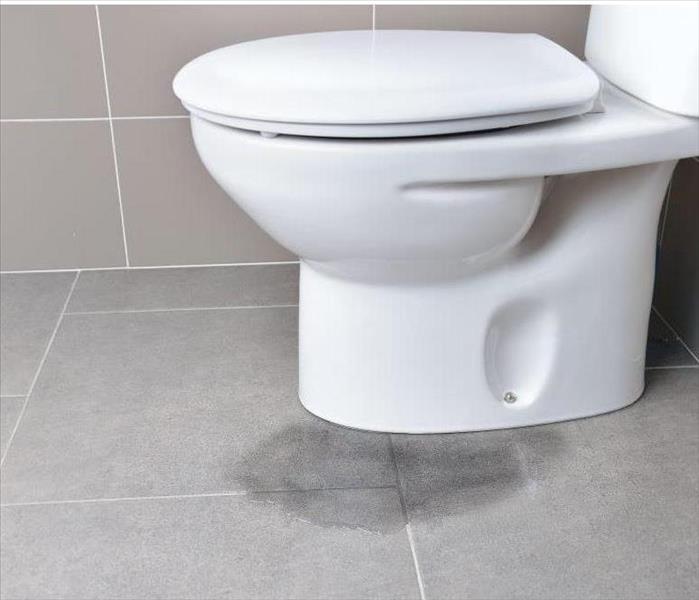Sewage Backups
1/20/2020 (Permalink)
Sewage backup is no easy task to deal with, and it’s more common than you think. A backup occurs when sewer water overflows from the drains in your home, like the sink, toilet, shower, and tub.
When dealing with sewer backup, it’s important to take the necessary steps to handle the mess to ensure that your personal items and space are properly sanitized; failure to do so can lead to greater damage and health hazards in the future.
Below are some commonly asked questions about sewage backup, plus, solutions to ensure your family’s safety.
What Causes Sewer Backup?
Various factors can contribute to sewage backup, but the most common cause is a clog in your sewer line, which typically occurs when solid material builds up over time.
Some common causes of clogs or sewer failure:
- Pouring things like excess fats and oils, coffee grounds, food solids, and large food waste down your kitchen sink
- Flushing excess soap, hair, toilet paper, paper towels, and sanitary napkins down the drain or toilet
- Broken or leaking pipes, poorly designed sewer systems (such as those invaded by tree roots nearby), snow and ice (Massachusetts can experience intense winter weather); or mainline backups caused by vandalism, natural disasters, or infrastructure breakdown
Can My Family Safely Inhabit the House After a Sewer Backup?
It’s definitely not safe for your family to stay inside your Lynn, Lynnfield or Nahant home after a sewer backup. The contaminated water is considered hazardous to your health, as it may contain pathogenic, toxigenic, or other harmful agents.
It’s important to ensure that your home is as sanitary as possible before re-inhabiting it. In many cases, property owners are not equipped to handle effective cleanup and professional mitigation and sanitation may be required.
What Hazards Are Commonly Caused by Sewer Backups?
Sewer backups can lead to hazards other than damage to your home, property, and possessions. If the area affected by the sewer backup goes untreated, it can lead to the spread of disease-causing organisms like bacteria, viruses, and parasites.
It’s important to avoid contact with the sewer water and anything it has been in contact with. The contaminants found in sewer water can cause painful irritations and rashes when they come in contact with the skin.
Ingesting contaminants can lead to nausea, abdominal pain, vomiting, diarrhea, and even hepatitis A. Inhaling airborne microorganisms can cause respiratory infections and allergic reactions as well.
Can I Clean Up The Mess Myself?
Although property owners are responsible for dealing with the aftermath of a sewer backup, you should only clean up the mess yourself if you’re knowledgeable of how to clean and sanitize effectively.
If your Lynn. Lynnfield or Nahant home has only experienced minor damage and you’re able to clean the area on your own, it’s recommended to take precautions by wearing rubber boots, protective gloves, goggles, and a facemask to minimize your contact with contaminants.
If your home has experienced major sewer backup (or if the water has been in contact with any electrical outlets), we recommend consulting an experienced professional before you begin cleaning up the mess—water is highly conductive of electricity.
Can I Use Bleach to Clean it Up?
It’s not a good idea to clean up the mess yourself if you’re not an experienced professional or without at least consulting with a professional first.
Bleach also isn’t a good solution for extensive cleanup because it does a poor job of eliminating the contamination left by standing sewer water. Although bleach is a common household disinfectant, sewer backup is much more harmful than common household messes and should be cleaned up with stronger disinfectants.
How Do I Know If Everything has been Appropriately Sanitized?
After the sewage backup has been cleaned up and you’re able to reenter the property, you can go through your space and assess what still needs to be cleaned (e.g., personal belongings, furniture, and surfaces). Some cleaning can be performed on your own; for everything else, SERVPRO of Lynn/Lynnfield can handle it.
If, for example, you want to appropriately sanitize the surfaces of your home affected by sewage backup, mix one quarter cup of bleach with one gallon of water and use this solution to clean all hard surfaces. Leave it on for at least one minute, and rinse the area with soapy water.
For carpets and fabrics that weren’t damaged or touched by the waste water, you can sanitize them with Lysol or another less abrasive ammonia product, rinse clean with soapy water, and repeat as needed.
Can I Keep Any Household Items After Sewage Backup?
With the exception of hard-surface items that can be properly cleaned and restore, you shouldn’t keep anything that came in contact with the sewer water. These items could have absorbed hazardous waste materials.
Sewer water is highly hazardous, so you wouldn’t want to risk you or your family’s health, no matter how badly you want to keep a personal item.
Is Sewer Backup Covered by Insurance?
In some cases, property owners are responsible for a sewage backup bill. That’s why it’s important to purchase homeowners insurance, and make sure sewer backups are covered in your policy, as it can provide thousands of dollars in coverage.
If you’re renting a home, be sure to discuss any issues with your landlord and/or property manager. Property owners are typically liable for this type of damage, but renter’s insurance may provide additional coverage as well.
Sewer backup can be stressful to deal with on your own, so it’s important to stay informed on all the necessary precautions needed to handle the situation.
For more information please call SERVPRO of Lynn/Lynnfield at 781.593.6663





 24/7 Emergency Service
24/7 Emergency Service
